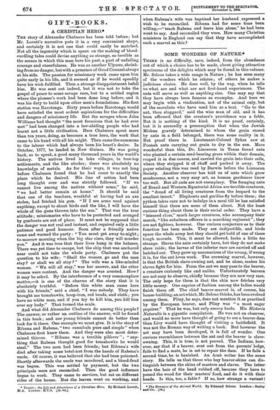A CHRISTIAN HERO.* THE story of Alexander Chalmers has been
told before; but Mr. Lovett's narrative puts it in a very convenient shape, and certainly it is not one that could easily be matched. Not all the ingenuity which is spent on the making of blood- curdling tales could devise anything so strange, so terrible as the scenes in which this man bore his part, a part of unfailing courage and cheerfulness. He was as another Ulysses, shrink- ing from no danger, butwith a presence of Good Counsel always at his side. The passion for missionary work came upon him quite early in his life, and it seemed as if he would speedily have his wish fulfilled. Then a strange disappointment befell him. He was sent out indeed, but it was not to take the gospel of peace to some savage race, but to a settled region where the pioneer's work had been done long before, and it was his duty to build upon other men's foundations. His first station was Rarotonga. Sixty years before Rarotonga would have satisfied the most ardent aspirations for the difficulties and dangers of missionary life. But the savages whom John Williams had thought "the most ferocious that he had ever met" had been changed into a law-abiding people who had learnt not a little civilisation. Here Chalmers spent more than ten years, doing, as becomes a true hero, the work that came to his hand with all his might. Then came the summons to the labour which had always been his heart's desire. In October, 1877, he landed in New Guinea. He was going back, so to speak, a good many thousand years in the world's history. The natives lived in lake villages, in tree-top settlements, and the like abodes; there was absolutely no knowledge of metals. As for their ways, it was not long before Chalmers found that he had come to exactly the place which he desired. His line of action had been long thought over and was strictly followed. "If we cannot live among the natives without arms," he said, "we had better remain at home." It should be said that one of the teachers, wrathful at having had an axe stolen, had fetched his gun. "If I see arms used against anything, except to shoot birds and the like, I will have the whole of the guns thrown into the sea." That was the true attitude;. missionaries who have to be protected and avenged by gunboats are out of place. It must not be supposed that the danger was not real and instant, and required only a little patience and good humour. Soon after a friendly native came and warned the party : "You must get away to-night ; to-morrow morning when the big star rises, they will murder you." And it was true that their lives hung in the balance. There was yet time to escape, but the ship that was anchored near could not take the whole party. Chalmers put the question to his wife : "Shall the women go and the men stay ? or shall we all stay?" The wife was a like-minded woman. "We will all stay," was her answer, and the other women were content. And the danger was averted. How ? it may be asked. By the interference of a very commonplace motive,—it is one of the charms of the story that it is absolutely truthful. "Before this white man came here with his friends," said a chief, "I was nobody. They have brought me tomahawks, hoop-iron, red beads, and cloth ; you have no white man, and if you try to kill him, you kill him over ray body." That turned the scale.
And what did Alexander Chalmers do among this people? The answer, or rather an outline of the answer, will be found in this book ; and our young friends cannot do better than look for it there. One example we must give. It is the story of Ribuna and Rabena„ "two cannibals pure and simple" when Chalmers first knew them. And they were also most deter- mined thieves. "Ribuna was a terrible pilferer " ; "any- thing that Rabena thought good for tomahawks he would steal." The two men had been friends; but Ribtma's wife died after taking some betel-nut from the bands of Rabena's uncle. Of course, it was believed that she had been poisoned. Shortly afterwards the uncle was murdered, and a blood-feud was begun. This was settled by payment, but the two principals were not reconciled. Then the good influence began to work. They came to services, but sat on different sides of the house. But the leaven went on working, and
• Temate : the Life and Adrentures of a Christian Hero. By Richard Lovett,
M.A. London: pa. 6d.]
when Rabena's wife was baptised her husband expressed-a wish to be reconciled. Ribuna had for some time been willing,—" teach Rabena, and leave him alone," he had been wont to say. And reconciled they were. How many Christian ministers in England can say that they have accomplished such a marvel as this ?


























































 Previous page
Previous page